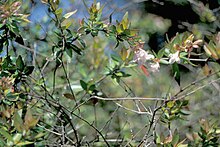Abelia × grandiflora
| Abelia × grandiflora | |
|---|---|
 |
|
| Glossy abelia (Abelia × grandiflora) | |
| Scientific classification | |
| Kingdom: | Plantae |
| (unranked): | Angiosperms |
| (unranked): | Eudicots |
| (unranked): | Asterids |
| Order: | Dipsacales |
| Family: | Caprifoliaceae (Linnaeaceae) |
| Genus: | Abelia |
| Binomial name | |
|
Abelia × grandiflora (André) Rehd. |
|
Abelia × grandiflora, the glossy abelia, is a hybrid Abelia, raised by hybridising A. chinensis with A. uniflora. It is a deciduous or semievergreen multistemmed shrub with rounded, spreading, or gracefully arching branches to 1.0-1.8 m tall. The leaves are ovate, glossy, dark green, and 2–6 cm long. The flowers are produced in clusters, white, tinged pink, bell-shaped, to 2 cm long. Unlike most flowering shrubs in cultivation, the glossy abelia blooms from late summer to well into the autumn.
Abelia × grandiflora was first raised in 1886 at the Rovelli nursery at Pallanza (now Verbania), on Lake Maggiore in Italy. It is used as an ornamental plant in specimen plantings in gardens, or in a mixed border with other shrubs. Propagation is by cuttings. Variegated forms are also available commercially.
Synonyms include Abelia rupestris Hort., Linnaea pringiana Graebn., and L. spaethiana Graebn..
...
Wikipedia
